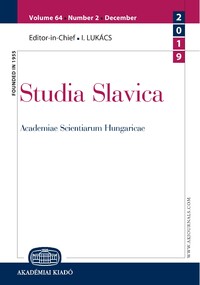З історії лінгвоукраїністики в Угорщині (мовознавча діяльність Ласлова Чопея)
From the History of Ukrainian Linguistics in Hungary (László Csopey’s Works on Linguistics)
Author(s): Erzsébet BáránySubject(s): Cultural history, Eastern Slavic Languages
Published by: Akadémiai Kiadó
Keywords: László Csopey; Ukrainian linguistics; Hungarian–Ukrainian language contacts; Transcarpathian Ruthenian dialects; Ruthenian textbooks; Ruthenian–Hungarian dictionary
Summary/Abstract: The investigation of Ukrainian linguistics in Hungary has a long history. The researchers in this field have focused mainly on issues of synchronic and diachronic dialectology, in particular Transcarpathian, as well as the problems of Ukrainian–Hungarian interlingual contacts. László Csopey’s name is first known in Ukrainian lexicography as the compiler of the Ruthenian–Hungarian Dictionary (Budapest, 1883). We have analyzed the paper Hungarian words in the Ruthenian language and the register of the Ruthenian–Hungarian dictionary in order to present the etymology of words that are controversial in terms of their origin and aimed to compare various assessments of the dictionary by linguists from the time of its appearance to the present. László Csopey was a Hungarian teacher, translator, and linguist. In the encyclopaedia of the Ukrainian language, he is described as follows: “László (Vasyl) Csopey – a Ukrainian linguist; he wrote in the language which is very close to the Transcarpathian folk language of the central part of the region”. Yurii Shevelyov adds: “Vasyl Csopey is a teacher, compiler of textbooks for public schools of Transcarpathia (1881–1890)”. In 2004, the Hungarian Slavist Attila Hollós prepared for publication the generalized work László Csopey’s life and works with an introductory paper by István Udvari. At the request of the Ministry of Education, László Csopey compiled and translated eight textbooks for public schools. He began to investigate Hungarian–Slavic language contacts and published the paper Hungarian words in the Ruthenian language in 1881. The paper can be considered the first in the field of investigation of Hungarian lexical borrowings in the Ukrainian dialects on the territory of present-day Transcarpathia. In his paper, the author has listed all the Hungarian lexical elements of the Bereg dialect known to him, pointed out the phonetic changes that took place in the Ukrainian language, and gave a thematic classification indicating, in fact, areas for further research. It is traditionally believed that the Ukrainian–Hungarian dictionary publication dates back to the second half of the nineteenth century with the appearance of Ruthenian–Hungarian Dictionary by László Csopey. The dictionary was highly praised by the Hungarian Royal Academy of Sciences and the author received the Fekésházi Prize. The dictionary register has 20,000 entries and reflects the lexical composition of the Transcarpathian East Slavic dialects well-known to the compiler. Living far from the Ukrainian-speaking area in the late nineteenth century, László Csopey emphasized the independence of the Ukrainian language, defended the right to its development and functioning. We believe that the analyzed dictionary is a valuable lexicographical work, and its author is considered the founder of Ukrainian–Hungarian lexicography. László Csopey’s work is still relevant up to now and it can be used by lexicologists, dialectologists, language historians as well as specialists in interlingual and interdialectical contacts, and its results form the basis for further research in these fields of linguistics.
Journal: Studia Slavica Academiae Scientiarum Hungaricae
- Issue Year: 65/2020
- Issue No: 1
- Page Range: 1-13
- Page Count: 13
- Language: Ukrainian
- Content File-PDF

